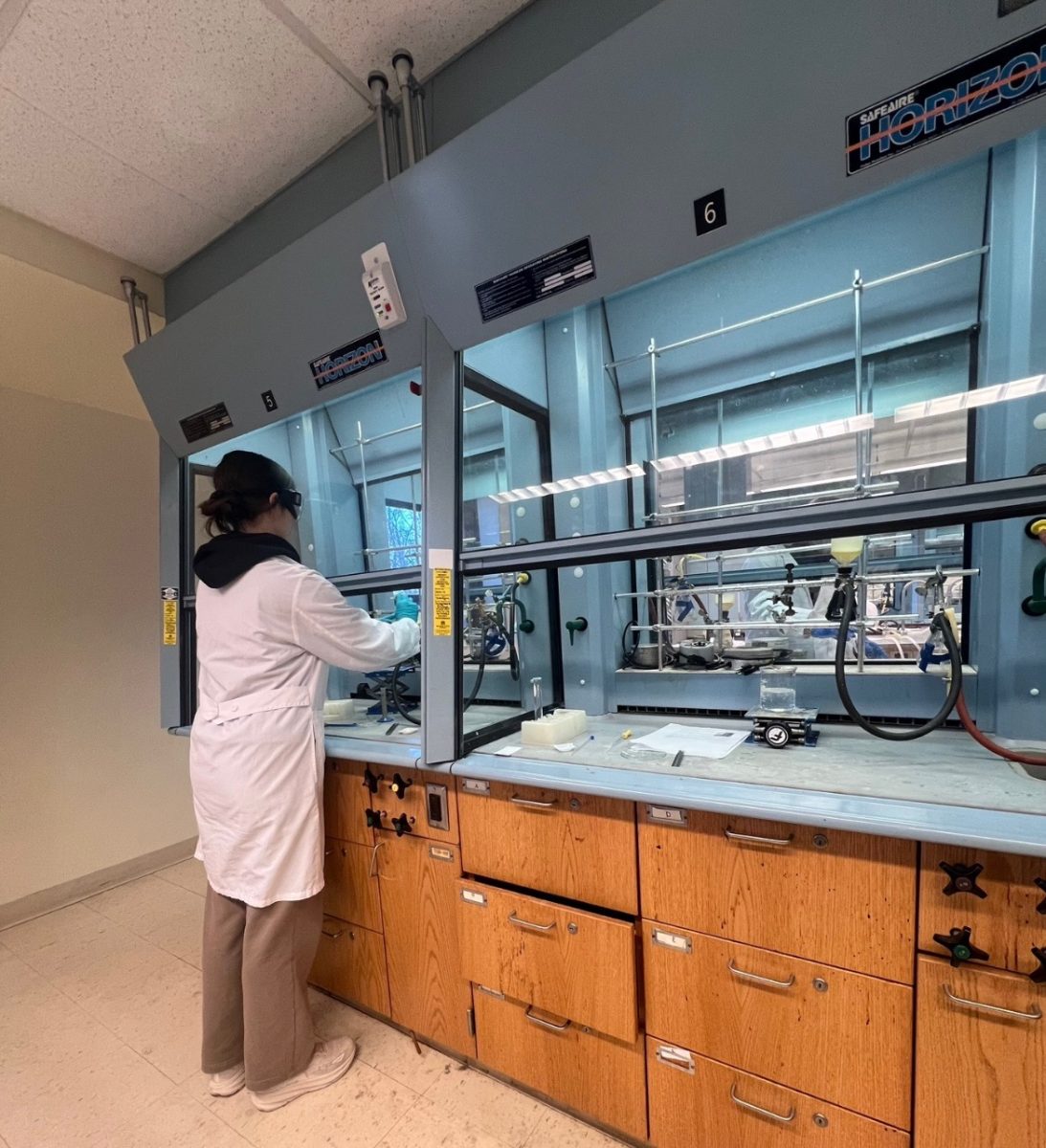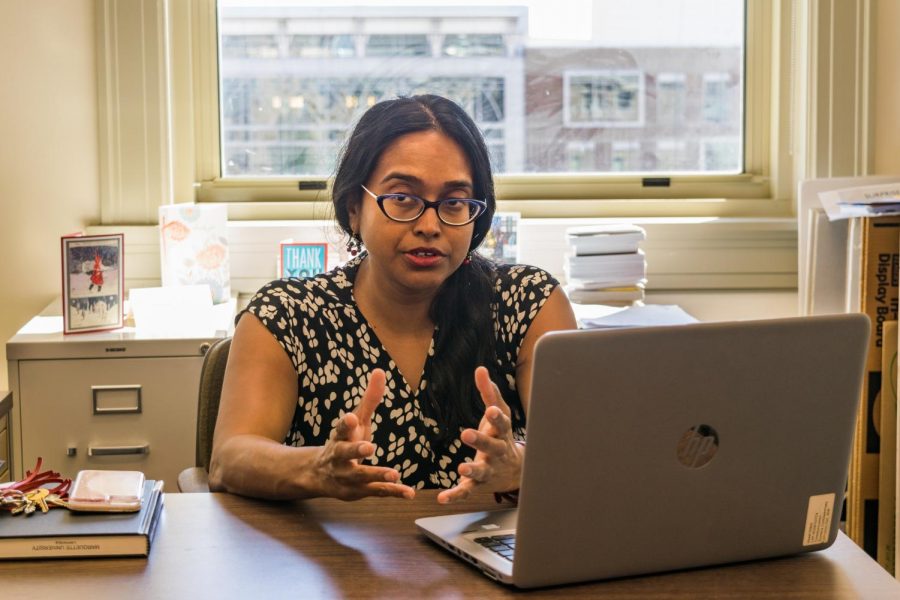With the goal of educating a greater and more diverse student body, Marquette University is working to expand its online learning programs, David Schejbal, vice president and chief of digital learning, said.
“Being named after a Jesuit explorer, it is central to Marquette’s mission and identity to be constantly assessing how we can adapt our unique Catholic, Jesuit educational experience to make it more accessible to nontraditional students. Improving our online offerings is just one of the ways we’re innovating to meet the needs of both our current students and the students of tomorrow,” Acting Provost Kimo Ah Yun, said.
Schejbal said enhancing the online learning program and creating more opportunities for students can allow Marquette to become more technologically and socially advanced. Schejbal was hired in August after administration showed interest in developing the program, he said.
“One of President Lovell’s interests and goals of the university’s Beyond Boundaries plan is to engage more with the greater Milwaukee community,” Schejbal said. “Marquette is very interested in developing its online presence and expanding its scope to attract a more diverse student body, which would include adult and nontraditional students both in Milwaukee and throughout Wisconsin.”
The university’s online learning program will provide opportunities for people in the community and all over the world to study through Marquette without having to come to campus. The program is designed for students who want to come to Marquette, but can’t because they live too far away or have responsibilities like work or family during the day, Schejbal said.
“It provides more access to the university for students who currently can’t take advantage of it,” Schejbal said. “One of the clear values of Marquette is to be inclusive and to be open to a greater variety of students, and to meet students’ needs, whatever those needs are.”
Currently the university offers more than 300 single courses across the curriculum and five online master’s degrees in Christian doctrine, corporate communication, business administration, supply chain management and health care data analytics, Schejbal said.
Shaun Longstreet, associate provost for educational development, is working with Schejbal to develop new online learning programs.
“Shaun has a lot of experience in the development of online programs and in working (with) and supporting faculty in the process, while I have a lot of experience with student recruitment and marketing (and) program development,” Schejbal said.
When deciding what new programs to develop, Schejbal said they first need to do market research to see which programs would be in the greatest demand for their target audience. When they know which programs they want to develop, they talk to the deans and faculty on campus to see who would be interested in working on the programs. They then work with individual faculty to convert traditional courses to online courses. Next, they launch the program, recruit students, and start enrolling and teaching.
“We are currently developing the first online undergraduate program in strategic communication through the College of Communication,” Schejbal said. “And we’ve got a couple of new master’s programs in development: one is health care administration and the other is health care leadership. The leadership program is specifically targeted toward professional nurses.”
Schejbal said his goal is to develop enough online courses to meet student demand and have several thousand students online.
“Technology is permeating how faculty teach in general,” Schejbal said.
One example of this is the development of virtual field trips. Virtual field trips were created so students can really experience what a site may be like without having to spend a lot of money to go to the site itself, Schejbal said.
“Faculty can really utilize the power of the technology to enhance the way that they teach students, and to bring the knowledge more to life in a variety of ways so that students who have very different learning styles can access the information in whatever way they need,” Schejbal said.
Katie O’Leary, a junior in the College of Health Sciences, took an eight-week philosophy class online through Marquette last semester.
Because it was an accelerated course, O’Leary said it was more work than she expected, making it very stressful at first.
Having the independence to learn at her own pace helped her work on her time management skills and balance all of her classes, O’Leary said.
“With a schedule, sometimes you have four classes in one day and it was nice to not have to add another class to have to go to,” O’Leary said.
Though O’Leary said she probably wouldn’t take another online undergraduate course, she said she would be interested in getting her master’s degree in speech pathology online if it was an option.
“When you’re already in your career and starting to get a handle on life, it’s a little more difficult to put in school time, and going out of the way to campus would be inefficient,” O’Leary said. “It would be a lot easier to do school from home.”
Similarly to O’Leary, Erika Thomas, a freshman in the College of Communication, said she is looking into getting her master’s in corporate communication online.
“I think that (having the option to complete the degree online) is nice because you’re not forced to go to grad school right after college,” Thomas said.
Thomas said she wants to enter the workforce right out of college and have her employer pay for graduate school, and she hopes to take her graduate school courses while working.
“You can go at your own pace and do it at your own time so there’s a lot of flexibility that works with your schedule,” Thomas said. “Let’s say you’re working 40 hours a week and you don’t have that much time to go to class too, you can come home after work and do 50 minutes of a class and work on it on the weekends as well.”
Longstreet has specifically been working with student services, athletics and Campus Ministry on ways for online students to feel like a part of the Marquette community.
“We call it ‘stickiness,’” Schejbal said. “We want students to feel connected, so it’s not just by taking classes, but by engaging in going to a basketball game or something like that. We’re providing students with opportunities so they can feel like real Marquette students.”
Schejbal said the online learning program is important to him because he wants to make sure the university serves as many students as it can.
“We really do limit how students are able to study if we say that the only way to do it is on campus Monday through Friday from 9 a.m. to 4 p.m.,” Schejbal said. “So by providing other ways to access faculty and programs, we really do grow the pie and provide more opportunities to students.”
Ultimately, Schejbal said the main goal of this program is to reach a broader audience and spread education to those who need it.
“We know that when you look at national statistics there is a close correlation between educational attainment, individual satisfaction with one’s lot in life and personal income,” Schejbal said. “So the more educated a person is, the statistics say that not only does a person make more money, but the person tends to be healthier, raises healthier and more engaged kids and contributes more to a functioning democracy.”








